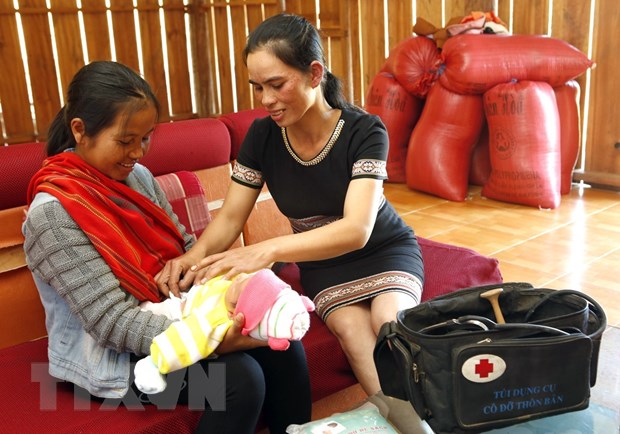HCMC – A project worth over US$2 million was launched late last week to prevent maternal deaths among Vietnamese ethnic minority women in the Northern Midlands and Mountains and the Central Highlands.
Women, especially pregnant women in 60 remote ethnic minority communes of the six most disadvantaged provinces of Bac Can, Lai Chau, Son La, Dak Nong, Kon Tum and Gia Lai will benefit from innovative interventions to stop preventable maternal deaths.
This is the ultimate goal of the “Leaving no one behind: Innovative interventions to reduce maternal mortality in ethnic minority regions in Vietnam” project, which was signed by the United Nations Population Fund (UNFPA) in Vietnam, biopharmaceutical company Merck Sharp & Dohme – MSD HH Vietnam, and MSD for Mothers.
Funded by MSD for Mothers and MSD Vietnam for US$1.2 million, the project is one of the most important initiatives to reduce maternal mortality among the ethnic minorities through innovative interventions, paying close attention to the special needs of ethnic minority women who are at risk of being left behind in the country’s sustainable development process.
UNFPA will deliver the project in collaboration with the Ministry of Health, the Provincial Departments of Health in the selected provinces and local civil society organizations until September 30, 2024.
In addition to financial contributions from MSD for Mothers and MSD Vietnam, UNFPA commits to making its own contributions to the project to the amount of US$810,000, thus leading to the total project budget of over US$2 million.
According to UNFPA, Vietnam has made significant progress in improving the sexual and reproductive health of the general population in the past 20 years, and was one of only six countries in the world to achieve the Millennium Development Goal No. 5 on the reduction of maternal mortality in 2015.
However, there have been disparities and inequalities in accessing and utilizing sexual and reproductive health services among different ethnicities and regions.
Current evidence shows that while the maternal mortality ratio has declined to 46 maternal deaths per 100,000 live births at the national level, it remains as high as 100-150 per 100,000 live births in the mountainous and ethnic minority regions.
Among all the maternal death cases in the Northern Midlands and Mountains, they are extremely high among some vulnerable ethnic minority groups, for instance the Hmong (60%) and the Thai (17%). Maternal mortality among the Hmong is seven times higher than the Kinh, the majority group.
More than half of the maternal deaths are at the district and provincial hospitals due to limited capacities of health care facilities to manage maternal complications.
In addition, remote and hard-to-reach geographical locations, low socioeconomic conditions, cultural barriers and a limited understanding of maternal complications are also contributing factors to high maternal mortality.
The project aims at increasing access to and the utilization of integrated, quality and voluntary sexual and reproductive health services among the ethnic minorities, improving the capacity on emergency obstetric care management in remote mountainous localities and building a village-based birth attendant network in the remote ethnic minority localities.
The project will also integrate Covid-19 prevention and control into the existing sexual and reproductive health program and deliver innovative health education and community mobilization to the ethnic minority communities to promote safe maternal deliveries.
Addressing the event, UNFPA Representative for Vietnam Naomi Kitahara said, “The signing to launch the project demonstrates UNFPA’s continued commitment to supporting the Government of Vietnam to ensure the rights of and choices for all, and to ensure the provision of quality sexual and reproductive health services to prevent maternal deaths, thus contributing to Vietnam’s efforts to achieve its sustainable development goals by 2030.”









